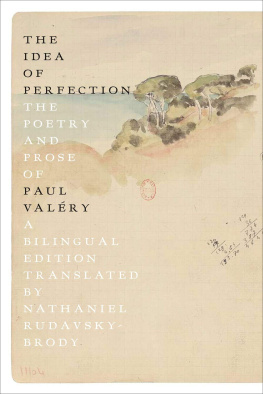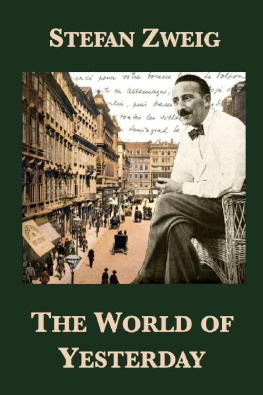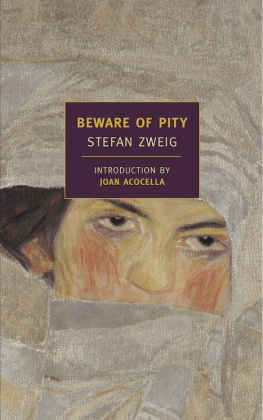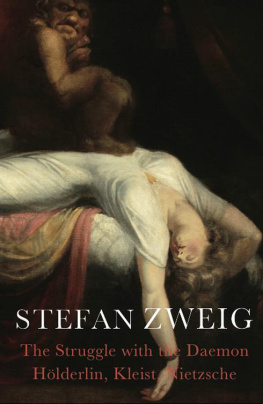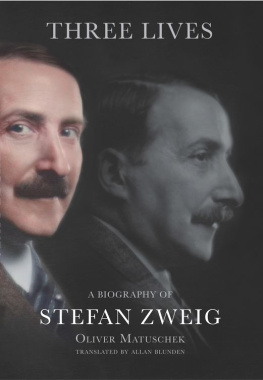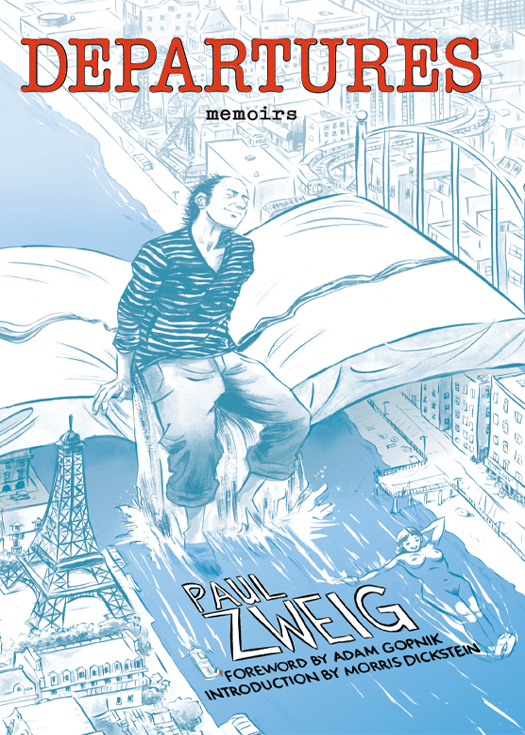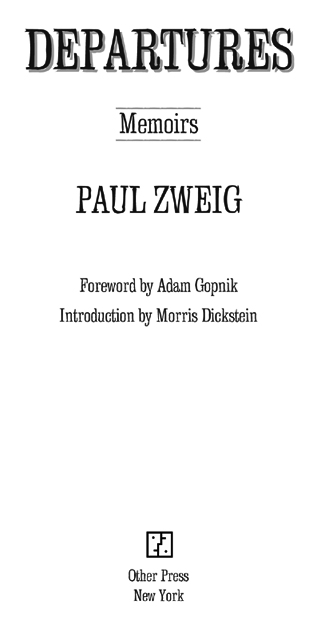P AUL Z WEIG died in 1984 at the age of forty-nine of lymphatic cancer. His wide-ranging career as a man of letters included: poet, critic, intellectual historian, and professor at Columbia University and Queens College. He wrote five books in the last ten years of his life: Departures, Walt Whitman: The Making of a Poet, The Heresy of Self-Love, Three Journeys: An Anthology, and The Adventurer: The Fate of Adventure in the Western World. Zweigs study of Whitman was nominated for the National Book Critics Circle Award in 1985.
A writer for The New Yorker since 1986, A DAM G OPNIK is the author of five books, including the national best sellers Paris to the Moon and Angels and Ages: A Short Book about Lincoln, Darwin, and Modern Life. He is also the editor of Americans in Paris: A Literary Anthology, published by the Library of America.
M ORRIS D ICKSTEIN is the author of Dancing in the Dark: A Cultural History of the Great Depression, which was a finalist for the 2009 National Book Critics Circle Award in Criticism. He is Distinguished Professor of English and Theatre at CUNY Graduate Center and the author of Gates of Eden and Leopards in the Temple, among other works.
Other Press edition 2011
Copyright The Estate of Paul Zweig 1986
Introduction copyright Morris Dickstein 1986
Foreword copyright Adam Gopnik 2011
First published in the United States of America by Harper & Row, Publishers, Inc. 1986
Production Editor: Yvonne E. Crdenas
Design revisions for this edition by Simon M. Sullivan
All rights reserved. No part of this publication may be reproduced or transmitted in any form or by any means, electronic or mechanical, including photocopying, recording, or by any information storage and retrieval system, without written permission from Other Press LLC, except in the case of brief quotations in reviews for inclusion in a magazine, newspaper, or broadcast. For information write to Other Press LLC, 2 Park Avenue, 24th Floor, New York, NY 10016. Or visit our Web site: www.otherpress.com
The Library of Congress has cataloged the printed edition as follows: Zweig, Paul.
Departures : memoirs/Paul Zweig; foreword by Adam Gopnik; introduction by Morris Dickstein.Other Press ed.
p. cm.
eISBN: 978-1-59051-424-5
1. Zweig, Paul. 2. Poets, American20th centuryBiography.
I. Title.
PS3576.W4Z464 2011 811.54dc22
[B] 2010050576
v3.1
For Vikki
FOREWORD
G OOD , true books have strange, long lives. Paul Zweigs Departures, here published again after too long a time away from print, is a posthumous book, first placed before the public after its authors tragically early death in 1984, and accumulating readers, like moss, ever since. I first came across its early, France-focused chapters in the course of anthologizing several hundreds of writers for a book about the American experience in Paris. Armpit-deep in too many tediously gay magazine accounts of wild weekends and Brasserie Lipp choucroute, with Zweig suddenly I was in the presence of someone who, without strutting about his own achievement, was deep inside France, as he was deep inside French. In those first chapters, Zweig tells of his flight from Brighton Beach to Paris in the early nineteen sixties, and of how he learns, all by himself, to read French at a caf on the rue de Tournonsoon taking on the preposterous job of trying to read all of French literature from the medieval to the late modernthen, and only then, entering French life as an insider, or at least as the impersonator of one, aligning and collaborating with the Front de Libration Nationale, the illegal Algerian resistance, and, as the central act of his transformation, loving a French womanno, a long sequence of French women. (With the essential modesty of a natural ladies man, Zweig takes his conquests, including a pair of seductive sisters, more or less for granted.)
Yet, as with any writer worth reading, what matteredall that matteredwas the quality of his line, the shape of his sentences. Zweig, I discovered as I turned the pages with growing excitement, combines a loving, word-conscious, self-delighted stream of poetic metaphor, of a kind one associates with serenely neoclassical writers such as Richard Wilbur and John Updike, with a melancholic sense of isolation and alienation that seems distinctly, overwhelmingly Jewish. He marries an often rhapsodic apprehension of the exterior face of the world with an angst-ridden soulfulness, managing somehow to be wittily detached from his experience and romantically anguished about it at the same time, an observing expatriate who has somehow turned himself into a suffering exile.
Reading those early chapters of Departures for the first time, with growing pleasure and attachment, I had no idea of what lay ahead, in the book as in the authors life: that Paul Zweig had died young, and tragically, of lymphoma, and that the climax, and final chapter, of the book involved his description of that dying. In his excellent and thorough and intimate introduction to the original volume, reprinted here, Morris Dickstein sounds, quite properly, a bassoon note of warning, just this side of an Ebbets Field raspberry, against sentimentalizing Zweigs writing because of his untimely early passing, and so let it be said that Zweigs writing does pass the test of ignorance. With the callowness of youth, or early middle age, as it happened, I had assumed, reading his Paris stuff, that he was just one more of those writers back there who needed to be overcome not admired, and was probably still teaching creative writing somewhere or other, probably in California. Though in fact we had just overlapped in New York, and mightheartbreaking thought for me nowhave met. (The guilt pangs of ascendant writers at those they Met and did not Mine remains constant: its a steady source of self-reproach to me that, though I met Alfred Kazin several times, and exchanged desultory politeness with him, I never read him until after he was gone, and the enthusiasm I felt, and the praise I would have given, was, for him, completely worthless. Nor can we kid ourselves that loving the work later is just as good. It isnt. We need our praise while we live; the afterlife belongs to editors and stepchildren. As Zweig himself quotes Malraux, approvingly, there is no death, only me dying, and no afterlife of literature, just the excitements of language and subject now.)
Zweigs Parisian material from Departures is remarkable, just judged by the cheap standards of foreign journalism. He bears witness, from deep inside, to a much less chronicled moment than the deadly, familiar Paris-American twenties, or even the oddly high-spiritedoddly because of the moral cost of the war that had just endedforties and fifties. His is the Paris of the early sixties, where Gaullism is in power, and the brutal unwinding of the Algerian war dominates public life, and a revolution in sexual liberty has taken placebut all of this still played out against the familiar landscape of a yet-to-be-scrubbed, gray and black Paris, a Paris still of old cafs and working-class quartiers, the matter of Godard played out against the settings of Ren Clair. He has, and records, intently erotic love affairs with French women newly emancipated but not yet serene in their emancipation: the nervous, chain-smoking, politicized children of Mao and Coca-Cola. The French sixties live in his pages as they live in those of no other American. Though one might cite Henry Miller as a precursor in the idea of Paris as a place to fuck first of all, Millers sex life has a brutal matter-of-factness, and an element of showthe matter-of-factness is the pointwhere Zweigs is wildly intense and self-reflective, even in its defeats. At times he seems almost self-annihilating in its intensities. He is not there to have a good time with the demoiselles; he is there to screw his old, American self to death. I could feel my lips pout when I spoke French, which I mastered with disturbing ease, as if deep down, I possessed a mobility that could thrust me into any character but the abandoned one of a boy born in Brooklyn who, in his flight from home, had gone too far; who always seemed to go too far, he tells us.




